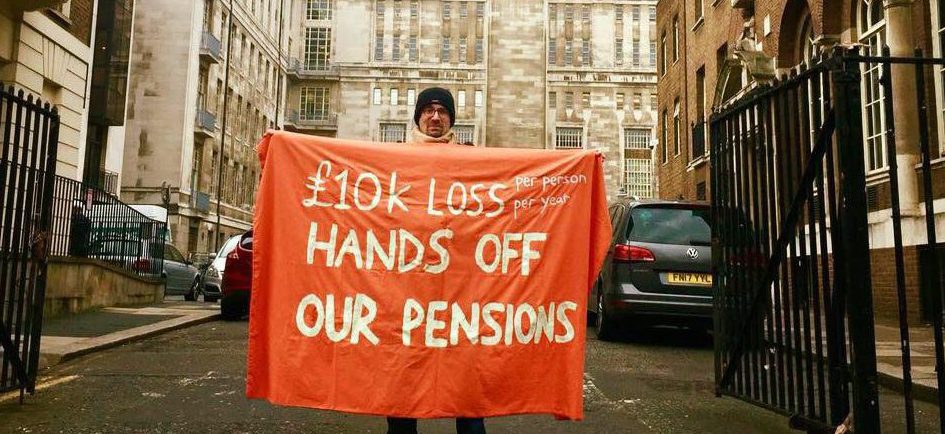Why the Pension Dispute Should Be of Concern to All University Workers
by UoL Worker
23 February 2018

In what is the biggest industrial action ever seen on UK campuses, this week, tens of thousands of lecturers and other university staff across the country have begun striking in protest against changes to their pensions. An anonymous University of London (UoL) staff member lays out the intricacies of the situation impacting workers in the capital.
In George Orwell’s Senate House some animals are certainly more equal than others. Charles Holden’s art deco masterpiece was the alleged inspiration for the Ministry of Truth in Orwell’s novel 1984, and is currently occupied by a UoL administration firmly committed to the tradition of Orwellian doublespeak.
While UoL is happy to toast its radical past, it takes a rather different approach when confronted with modern-day radicals. Proudly celebrating the 150th anniversary of the admittance of women to the University in 2018, it neglects to mention its current outsourcing policy, which denies a predominantly female and migrant cleaning workforce the same terms and conditions as their directly employed colleagues. Nor does it mention the current outrageous attacks on the pensions of academic staff such as myself, which have prompted the biggest higher education strikes in living memory.
The most significant difference between the two groups of workers comes in terms of pension provision. Outsourced workers (cleaners, porters, security, maintenance, catering, postroom, audio-visual and gardeners) are typically given the minimum possible defined contribution pensions, with a one percent contribution from the employer. By contrast, university employees like myself are in defined benefit schemes – the Superannuation Arrangements of the University of London (SAUL) for administrative staff, and the Universities Superannuation Scheme (USS) for academic and managerial – which guarantee us a certain proportion of our salary upon retirement, with employer contributions as high as 18%.
Following months of tireless campaigning and strikes, these workers could soon be brought in-house, enjoying the same benefits that workers like me have for so long taken for granted. But in a development which is both heart-breaking and supremely ironic, just as proper pensions are within the grasp of these vulnerable workers, the university is seeking to end them for everyone. UoL is part of the employers group Universities UK, which covers over 60 pre-1992 higher education institutions across the UK. Academic and academic-related staff at these universities are part of the USS pension scheme, which now faces the closure of its defined benefit element.
This change to the scheme is of an existential nature, with risk being shifted from employer to employee and a likely 40% cut in the value of the pensions.
And it’s angering for a number of reasons. Firstly, it’s unnecessary; the scheme as it stands is robust. A deliberately pessimistic valuation has been adopted in order to create a fake crisis. Secondly, a majority of the employers are also against the changes, but have been over-ruled by a vocal minority of rich institutions led by Oxford and Cambridge Envious of their Ivy League rivals, they wish to borrow more cheaply to finance expansion and want the pension scheme liabilities off their balance sheets in order to do so. Disgustingly, they don’t actually want to go it alone, as that would incur more risk, so they are instead seeking to destroy the scheme for everyone.
In the face of this impending disaster for higher education staff, some vice-chancellors have spoken up, calling for negotiations to restart. At UoL, however, staff wait in vain for vice-chancellor professor Sir Adrian Smith to make a single comment on the issue. This is hardly surprising, of course – Sir Adrian has been noticeably absent from the moral debate over outsourcing at his university and is seemingly content to allow pensions to be stripped from myself and my colleagues. I have just checked the pension modeller, and under the new plans my pension income would fall by £8.5k a year – a far cry from what we were promised when we were encouraged to enter the scheme.
Meanwhile, for Sir Adrian and his senior management colleagues there is no shortage of cash. £100k salaries have mushroomed in recent years, the University has reserves of over £150m and this week came the extraordinary revelation that the vice-chancellor sits on the very committee that determines his salary.
Thus, behind the claims of radicalism, the conveniently timed celebrations of women and new diversity policies, the true nature of UoL becomes clear. On the one hand, there are the workers, both outsourced and in-house, fighting for the decent retirement income that should be afforded to all. On the other; an echelon of super-management – aloof, indifferent and utterly unconnected to both their workforce and the true ideals of the university.
And from this, another one of the key aims and effects of outsourcing emerges; the difficulty in lawfully coordinating actions between workers with different employers. When outsourced workers strike, sympathetic in-house colleagues are legally obliged to cross the picket line. And similarly, when our strike starts on Thursday, outsourced workers will not be able to join us. Obviously this not only divides and confuses people, but weakens each of the respective struggles.
But we are working to overcome these obstacles. As the academics prepare for their strikes, they will be joined in March by the biggest outsourced strike in UoL’s history. This week, the Independent Workers Union of Great Britian announced ballots of security, cleaners, porters, postroom and AV staff. Furthermore, when the campaign succeeds and these workers are brought in-house, they will then be able to join potential future action by admin and academic staff.
Unity seems closer than ever – and it’s certainly more vital than it’s ever been. Only united can the workers save their dream of a secure retirement for all.